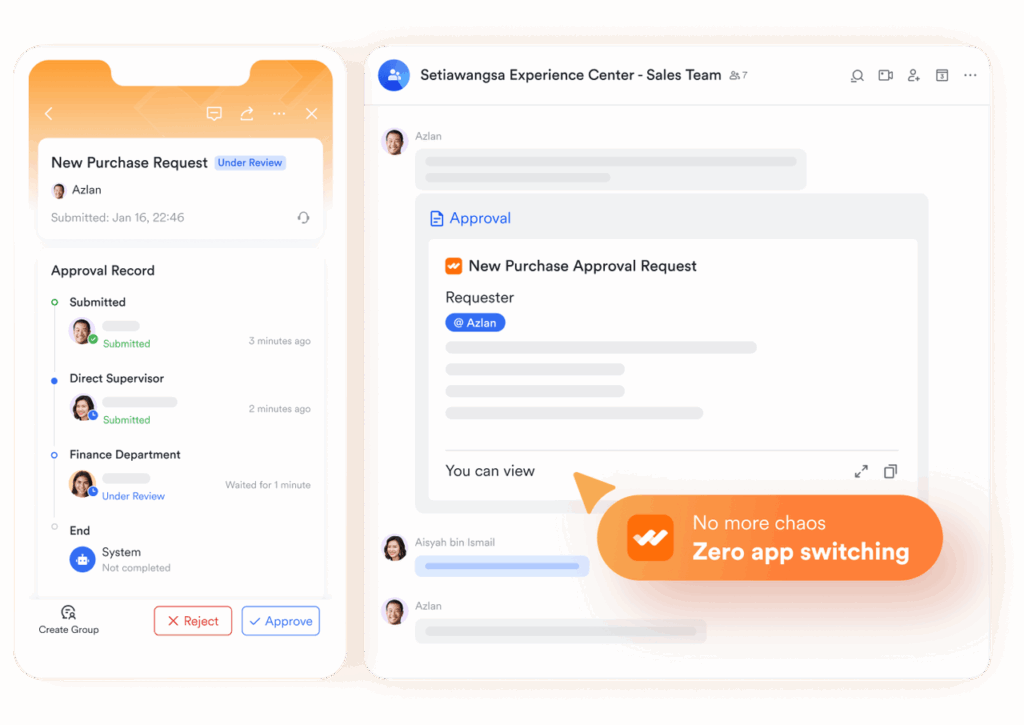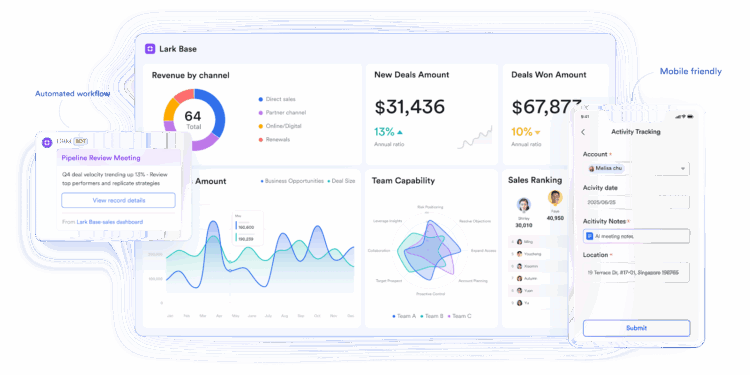Every firm has problems that are obvious to observe. They are the approvals that take days instead of hours, the email chains that get longer with each small change, and the progress updates that necessitate another meeting. These issues not only slow things down, but they also make people less interested, less excited, and less creative.
That’s where automation really helps. The finest project management tools do more than just keep track of what needs to be done. They also help you learn how your organization works. They turn everyday tasks into systems that employ their own logic, which frees individuals up to work on more essential things.
Lark makes this power tangible by developing an integrated environment that automates cooperation, reduces redundancy, and speeds up the process of making decisions. Here’s how its connected features help with daily tasks without creating a lot of noise.
Lark Base: Making data movement effortless
Data moves slowly in most firms. Spreadsheets hold on to updates until someone puts them all together by hand. Leaders make choices based on snapshots instead of current data. Lark Base changes that by turning information into a living system that flows across teams on its own.
When teams record project milestones, client updates, or resource usage, that’s not the end of it. Base connects these records to related projects and tables, so everyone who needs to know about a change receives it immediately. When marketing adds new charges, finance can see the budget shifts right away. Operations might adjust timetables when product teams meet certain goals.
This continuous movement of information solves the everyday complications that arise when tools operate in isolation. Many organizations rely on CRM software to keep customer updates visible; similarly Base offers a clean, structured database and tables for internal work, ensuring data stays consistent and accessible across teams. No one has to spend hours reviewing information or checking whether updates are accurate. Base keeps everyone aligned, so work remains up to date without extra effort.
Lark Messenger: Turning communication into coordination

Things typically go awry when people don’t notice that they’re not talking to each other. Teams send each other hundreds of messages, but not much of that talk leads to action. Lark Messenger fixes that by making conversation transform into organized progress.
There is something you can do with every message on Messenger. Leaders can turn a discussion point into a task, link it to a project, or set up a meeting all from the same chat window. This means that teams no longer have to move between apps or lose track of follow-ups in untidy inboxes. A single thread may handle the complete life cycle of a decision, from coming up with the concept to putting it into action, without any handoffs.
Messenger also helps people from various departments talk to each other more easily. With topic-based threads, threaded answers, and built-in document sharing, information stays organized and easy to access. Teams get to work straight away instead of wasting time looking for files or figuring out what’s going on. The result is faster response times, less delays, and a natural flow of communication that gets things done instead of producing noise.
Lark Tasks: Automating execution from start to finish

Messenger links the conversations, and Lark Tasks links the tasks. This is where genuine operational automation begins: an area designed to build, monitor, and maintain an intelligent automated workflow running.
Tasks eliminate the need to check in and follow up by hand. As soon as a task is created, it goes to the next person in the workflow. Deadlines, dependencies, and reminders are all built in. The technology automatically tells the reviewer when a designer is done with a deliverable. The next team understands it’s time to start their phase once the review is approved. Nothing gets lost, and nothing has to wait for no reason.
The openness is quite helpful for managers. Dashboards show how things are going right now, including difficulties and how many tasks have been finished. Leaders don’t have to ask for updates; they can detect problems straight away and send people where they are needed. People don’t have to push Lark Tasks to keep every workflow flowing.
Lark Docs: Reducing repetition in collaboration

Documentation and collaboration are where operational drag usually hides. Teams make a lot of copies of the same document, provide feedback through long email threads, and lose track of which copy is the final one. Lark Docs solves this problem by giving everyone a single, live space to work in.
All of Lark’s documents are dynamic. More than one person can edit at once, offer comments that are relevant, and tag other people to get speedy feedback. Docs works with other features like Base and Tasks, so embedded data and dashboards update right away as the information they are based on changes. You don’t have to make new reports and strategy plans every week because they always show the most current numbers.
This live, interactive way keeps people from doing the same thing twice. Teams work from one version that updates in real time, whether they are preparing a project proposal or making their quarterly goals better. The result is that people spend a lot less time looking for, comparing, or merging versions, which is a hidden loss of time that slows down most firms’ productivity.
Lark Calendar: Reclaiming time through intelligent scheduling

Meetings are vital, but they happen too often. It takes a lot of effort for teams to plan meetings, change the calendar, and make sure everyone is on the same page across time zones. Lark Calendar fixes this by automating the logic of scheduling and placing the context of a work straight into events.
Lark suggests the optimum times for a meeting based on when everyone can make it, even if they are in various regions of the world. It also enables you to attach important files, or project information, so that everyone is prepared and knows what to expect. During the meeting, teams can write down notes and give each other tasks. When the conference is over, these tasks will immediately sync with the main workspace.
This automation saves hours a week by cutting down on the time spent coordinating and following up. The platform handles the paperwork, so meetings are shorter, more focused, and more to the point. Automation can’t create time, but it can protect it. Lark Calendar gives leaders and teams back time.
Lark Approval: Streamlining governance through automated workflow

One of the most hidden and costly challenges of running a business is slow approvals. They stop customers from buying items, slow down projects, and make teams wait for approvals. Lark Approval fixes this by turning the approval procedure into an automated workflow that uses logic instead of waiting.
Requests don’t travel through emails or papers anymore. Instead, they go through predetermined digital approval channels that automatically move from one approver to the next. For example, a new purchase order can travel from the project lead to finance and then to the department head without anyone having to execute it by hand. Every step sends out quick messages and reminders to keep things going.
The system’s built-in tracking makes sure that every choice is seen, written down, and can be checked. Leaders keep an eye on things without getting too involved, and approvals that used to take days can now happen in minutes. Lark Approval translates governance into action, making sure that operational control doesn’t get in the way of efficiency.
Conclusion
Operational inefficiencies don’t normally show up on their own; they happen when tools, teams, and tasks don’t work well together. Lark’s best skill is filling in those gaps. It makes the daily grind of updates, approvals, and coordination into a flow that keeps running on its own, with information and action moving together.
By automating operations, giving real-time visibility, and allowing linked communication, Lark helps firms get rid of the small delays that add up to major inefficiencies over time. Teams don’t have to spend time keeping workflows going anymore; they can spend that time making them better.
Lark is more than just another tool for busy CEOs who want to get things done quickly without making a mess or being overly strict. This is the new standard for smart project management software: a place where everything works well and people can finally do their best work.













